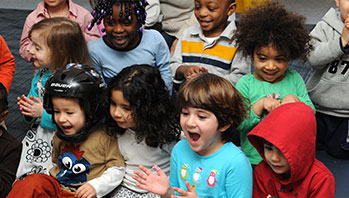- name cards
MA Standards:
English Language Arts/Speaking and Listening/SL.PK.MA.1a: Observe and use appropriate ways of interacting in a group (e.g. taking turns in talking, listening to peers, waiting to speak until another person is finished talking, asking questions and waiting for an answer, gaining the floor in appropriate ways).
English Language Arts/Foundational Skills/RF.PK.MA.2: With guidance and support, demonstrate understanding of spoken words, syllables, and sounds (phonemes).
Head Start Outcomes:
Social Emotional Development/Self-Regulation: Follows simple rules, routines, and directions.
Language Development/Receptive Language: Attends to language during conversations, songs, stories, or other learning experiences.
Literacy Knowledge/Phonological Awareness: Identifies and discriminates between separate syllables in words.
PreK Learning Guidelines:
English Language Arts/Language 1: Observe and use appropriate ways of interacting in a group (taking turns in talking; listening to peers; waiting until someone is finished; asking questions and waiting for an answer; gaining the floor in appropriate ways).
English Language Arts/Reading and Literature 12: Listen to, recite, sing, and dramatize a variety of age-appropriate literature.
English Language Arts/Reading and Literature 8: Listen to, identify, and manipulate language sounds to develop auditory discrimination and phonemic awareness.
Greeting Song: “Clap a Friend’s Name” #10

© Commonwealth of Massachusetts, Department of Early Education and Care (Jennifer Waddell photographer). All rights reserved.
ELA Focus Skills: Name Recognition, Phonological Awareness (Segmenting)
Chant “Clap a Friend’s Name” and hold up the name of one child. Have that child identify himself or herself, then invite everyone to clap the syllables in the child’s name with you, for example: Ra-quel-it-a. Ask, How many times did we clap? Four! There are four parts in Raquelita’s name.
Continue holding up name cards until you have identified each child and clapped the syllables in his or her name.
Adaptation: Add photos or stickers to help very young children recognize their name cards.
Social Emotional Tip: Offering opportunities for children to participate in group activities helps them increase their ability to interact easily and cooperatively with others.
Social Emotional Tip: Changing procedures with greeting songs helps children build the ability to manage transitions and adapt to changes in routines and new situations.
